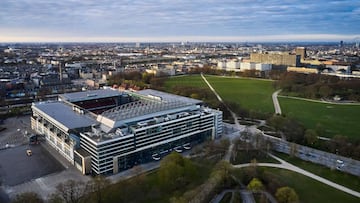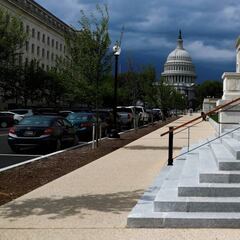Coronavirus: FC Copenhagen convert stadium into school classroom
A visit to the national football stadium is usually a big occasion in a young fan's life, but for some schoolchildren in Copenhagen it has become part of the daily routine.


When the full extent of the coronavirus threat was first revealed, Denmark acted quickly and introduced some of the strictest measures in Europe to help stem the spread. The measures were so effective that Denmark has now entered into the second phase of its response to the pandemic, with some public spaces now reopening.
Coronavirus safety requirements lead to space issues as schools reopen
Primary schools in Denmark began gradually re-opening in Denmark in late April but, with a social-distancing requirement of 12 square metres per pupil (twice the guidelines for adults), finding space for students was proving a struggle.
To help provide extra space for pupils, the Telia Parken Stadium, home to FC Copenhagen and the Danish national team, has been opened for around 200 fourth- and fifth-grade pupils from the capital. The 38,000 seats give pupils plenty of space to safely spread out and the tiered seating helps teachers to communicate with a more dispersed classroom.
Lars Bo Jeppesen, director of Parken Sport and Entertainment, the company that owns the stadium, said that he was glad to have been able to help and hoped that students would enjoy the new surroundings. "We all have a responsibility to find creative solutions in a difficult time, and we hope it can help give students some fun memories,” Jeppesen said. "Personally, I think at least it's a bit of a child's dream to be allowed to go to school here, so we are happy to help."
A statement from FC Copenhagen’s COO Katja Moesgaard said that the club felt it was their responsibility to help educate Copenhagers. She added: "Our teachers and educators right now are making a huge effort to send our children back safely, and here we can help them a bit."
Today around 200 Copenhagen school children from 4th and 5th grade started their first day in their new temporary school, Telia Parken, by singing the national anthem🇩🇰🎓 https://t.co/JzSSiJP2c6
— F.C. København (@FCKobenhavn) May 11, 2020
Disused tourist attractions repurposed
The issue of space in the Danish capital is not surprising considering that it is home to over a third of the country’s population. To support the schools reopening, Jesper Christensen, the deputy mayor for children’s issues, released a statement in mid-April calling for more creative thinking to find solutions.
"We must be able to offer care to the parents who have a need," she said. "We need to be creative, and I am pleased to find that our large cultural companies, housing associations, and sports institutions are willing to step in."
Related stories
In recent weeks the Copenhagen Zoo, the National Museum of Denmark and Tivoli Gardens amusement park have all volunteered their use as temporary schools and day care. Denmark is not insisting that adults or children use face masks in public but all public spaces being used for the scheme will be cleaned and sanitised regularly.
Similar agreements have been made with over 100 businesses, and institutes around the city and have so far provided safe schooling and day care for around 3,300 children.

